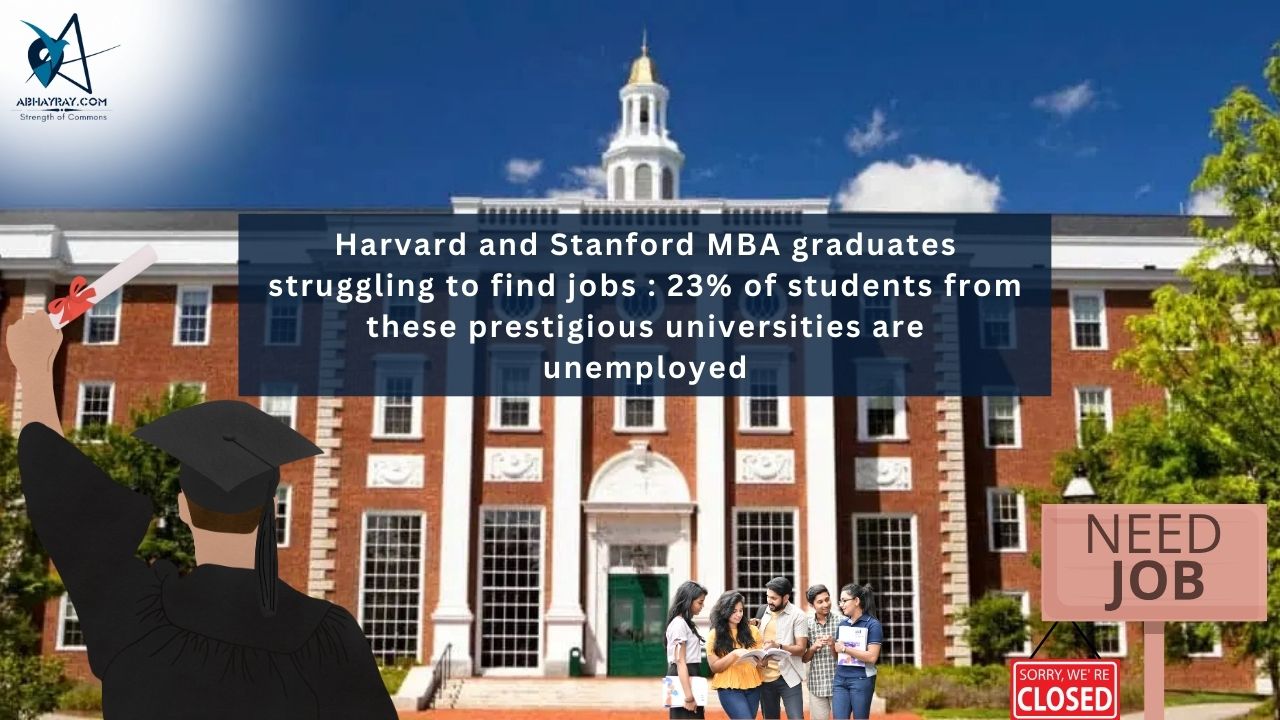Introduction
Some of the world’s prestigious educational institutions like Harvard University, and other top B schools are observing a declining trend of employment among MBA graduates. According to a recent report by The Wall Street Journal, the famous Harvard Business School (HBS) has 23 per cent of MBA graduates unemployed three months after graduation.The decline is evident not only in Harvard, but institutions like Stanford, Wharton, and other top business schools are also witnessing a similar trend among MBA graduates. This rise in unemployment has forced many to question the viability of an MBA degree for a high-paying job role. As the economy shifts and companies rethink hiring strategies, some of the most sought-after degrees are no longer offering the guarantees they once did. This marks a significant shift, as companies prioritize specialized technical skills over generalist MBA’s.
Declining job placement rates among top MBA’s
According to a Wall Street Journal report, 23 per cent of Harvard Business School (HBS) MBA graduates from 2024 were still job hunting three months after graduation. This is a sharp increase from 20 per cent in 2023 and 10 per cent in 2022. Harvard’s Kristen Fitzpatrick, who oversees career development, told WSJ, “We’re not immune to the difficulties of the job market. Going to Harvard is not going to be a differentiator. You have to have the skills.”
Key Factors involved in Changing Job Market
The tightening job market can be attributed to several factors. Post-pandemic, companies have aggressively pursued efficiency, rethinking organisational structures, and highlighting leaner teams. This has created a preference for candidates with specialised technical skills over generalist MBA graduates.Factors such as tech industry slowdowns, AI, automation, and restructuring are contributing to the decline in job placements, prompting graduates to reconsider the return on investment of their degrees.
- Focus on Efficiency & Restructuring
Many experts suggest that the trend is because of economic shifts and changes in the hiring strategies of the companies. The shift in the job market according to The Wall Street Journal report, is because of increasing focus on ‘efficiency’ and ‘restructuring’ of teams. The report also asserted that employers are looking for more specialised technical skills, such as coding or data analytics, rather than hiring generalist MBA’s. The emphasis on restructuring and efficiency emanates from scaled-back hiring instances from Amazon, Google, and Microsoft who have made cuts to hiring opportunities. Not only companies but consulting firms like McKinsey and BCG, have also reduced the number of MBA hires for 2024, highlighted the report.
- The Impact of AI and Automation
The rise of artificial intelligence and automation has added another layer of complexity. As companies adopt new technologies, roles that traditionally required an MBA are being redefined or eliminated. According to The Wall Street Journal, employers are increasingly turning to alternative educational paths such as coding boot camps or certifications, which offer more targeted training for today’s evolving workforce. Harvard and other institutions are turning to AI to navigate this evolving landscape. Tools now recommend job matches and courses to address skill gaps, reflecting a shift in how graduates and institutions tackle an increasingly selective job market.
|
School
|
Unemployment Rate (%) |
Key Factors Contributing to Decline
|
|
Harvard Business School |
23 |
Shift to specialized skills, reduced tech and consulting hiring.
|
|
Stanford Graduate School |
22 |
Increased competition, tech industry slowdown.
|
|
Wharton School |
20 |
Leaner corporate structures, Al-driven job displacement.
|
| Kellogg School of Management | 13 |
Delayed hiring cycles, broader economic uncertainty
|
What Aspiring Leaders Can Do
In today’s competitive job market, adaptability is crucial. While education is important, many employers are prioritizing skills over formal degrees. Here are practical steps for Gen Z job seekers, business leaders, and future leaders looking to boost their career prospects:
- Develop Transferable Skills
Employers place increasing value on soft skills like adaptability, emotional intelligence, and problem-solving. These qualities often outweigh technical expertise, particularly in leadership or strategic roles.
- Commit to Lifelong Learning
With the high cost of an MBA, the return on investment is worth considering. While attending elite institutions is impressive, it’s not always necessary. Platforms like Coursera, LinkedIn Learning, and Nvidia offer affordable AI training that could enhance your career potential.
- Shift Focus from Social Media to Social Skills
Leverage both online and offline professional networks for career advancement. Attend industry events, participate in LinkedIn groups, and reconnect with alumni to expand your connections. Building relationships and showcasing your value can help you access the hidden job market.
Conclusion
As companies continue to adapt to new economic conditions, MBA programmes must also reevaluate how they prepare students for a constantly evolving workforce, recommended the report. To address these challenges, some business schools are introducing innovative solutions. Harvard, for example, is testing an artificial intelligence (AI) tool that matches job seekers with potential roles and recommends courses to bridge skill gaps. This AI-driven approach aims to help students adapt to the evolving demands of the job market. For aspiring leaders, the message is clear: success in today’s job market requires a blend of technical skills, emotional intelligence, and resilience. As companies prioritise lean operations and specialised expertise, the traditional MBA journey must evolve to align with these new realities.
GMICapitals.com RaysVeda.com GetMyStartup.com LawCanal.com GetMyIndia.com ZinCob.com Angeltors.com

